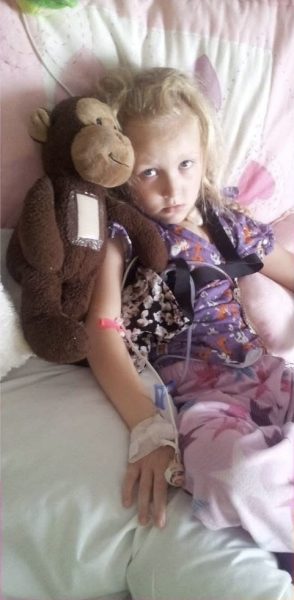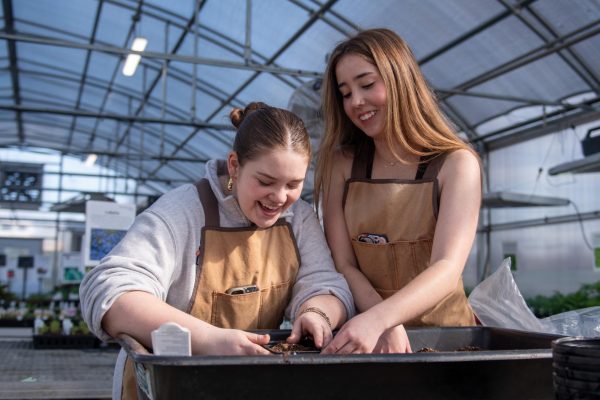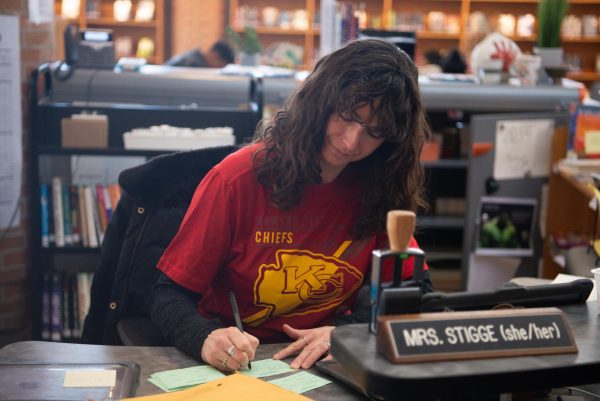Don’t judge by looks
English teacher Daniah Hammouda works to help others look past stereotypes based on appearance
May 21, 2019
“Good morning!” ELA 3 teacher Daniah Hammouda said as she greeted her second hour class with a friendly smile. Wearing a red hijab, a black and grey long-sleeved shirt with black pants and black shoes, Hammouda only shows her face and hands. The rest is covered to keep the world out.
Although many see her hijab as restrictive, Hammouda disagrees.
“It’s actually very free and liberating,” Hammouda said.
According to Hammouda, the hijab allows her to ignore the standards of fashion, to avoid the pressure of the definition of beauty that is put on women every day.
And Hammouda’s hijab connects her to her religious beliefs as well.
“I don’t wear the hijab for a man,” she said. “I wear it to display a connection with God. That’s first and foremost.”
The hijab plays an important role in her identity.
“The best thing about the hijab is it gives a clear marker for your identity,” Hammouda said. “It pushes you to come to terms with who you are a lot sooner and love yourself for who you are a lot sooner than other people that don’t have a clear marker for their identities.”
Muslim women don’t have to wear a hijab if they don’t want to..
“It’s different for everyone,” Hammouda said. “It depends on when a girl goes through puberty. That’s when she’s technically required to wear it. But again, it’s about the comfort level of a person. Some people like to wait until they are more ready which is their choice. No one can force you to wear a hijab. You can also choose to wear it earlier.”
As a Muslim, Hammouda’s day is filled with religious moments.
“We have to pray five times a day,” Hammouda said, beginning before sunrise. “When I come back from school, I pray and, later on, I pray three more times. One of them is in the night. So it does impact because it forces you to remember God at least five times a day.
As a Muslim she has follow certain dietary rules.
“There are certain things we can’t eat, pork or any pork products,” Hammouda said. “We can’t drink alcohol. There are other certain restrictions that are more specific, but those are the main ones that affect what we eat.”
Her family wasn’t always Muslim. Her mother was Christian before she converted to Islam.
“From what I understood, she converted to Islam because Christianity never made sense to her,” Hammouda said. “She never understood the concept of a human being God and Jesus being someone who is divine. In the Islamic religion, there is only one God and his prophets.”
Hammouda struggled a bit in high school as a result of her religious beliefs..
“I hated the first two years of high school,” Hammouda said. “I felt very isolated from the rest of the students. I felt like I was never accepted. I have had a lot of experience (with) people saying really hateful things to me, which made me hate high school even more.”
Her last two years of high school were a lot better, but there were still problems.
“I went to Shawnee Mission South,” Hammouda said. “We had an Arabic program which attracted Muslims, so we could have our own ‘clique’ there. That is how I found people just like me”
Hammouda always knew she wanted to be a teacher since she was little.
“I wanted to be a teacher since when I was really young kid,” Hammouda said.” Since I was in kindergarten. I thought about law school because I was really interested in law, but I thought I would have more impact as a teacher. I just love teaching so much.”
Hammouda became a teacher to help students avoid what she went through in high school.
“I wanted to be a teacher because I had some teachers who were extremely terrible and racist. I wanted to be the teacher who provided a safe space for my students to talk about things that matter to them,” Hammouda said. ‘A lot of teachers will say I became a teacher because I had a amazing teacher that changed my life. What I had was a teacher who changed my life for the worse, but that pushed me to rethink education, and the way we do education and want to change it. I think the most impact that I can make as a human in society is through education.”
Hammouda wants to make the world a better place where no one suffers from discrimination.
“I want to impact society and the best way to do it is through young people,” Hammouda said. “I see a lot of energy in young people to change these terrible things that we have in our world.”
“I want people to see beyond stereotypes… See beyond on what they hear in the news,” Hammouda said. “Like go up to someone who is different to you and just talk to them.”








